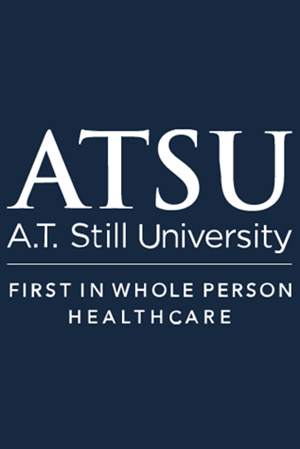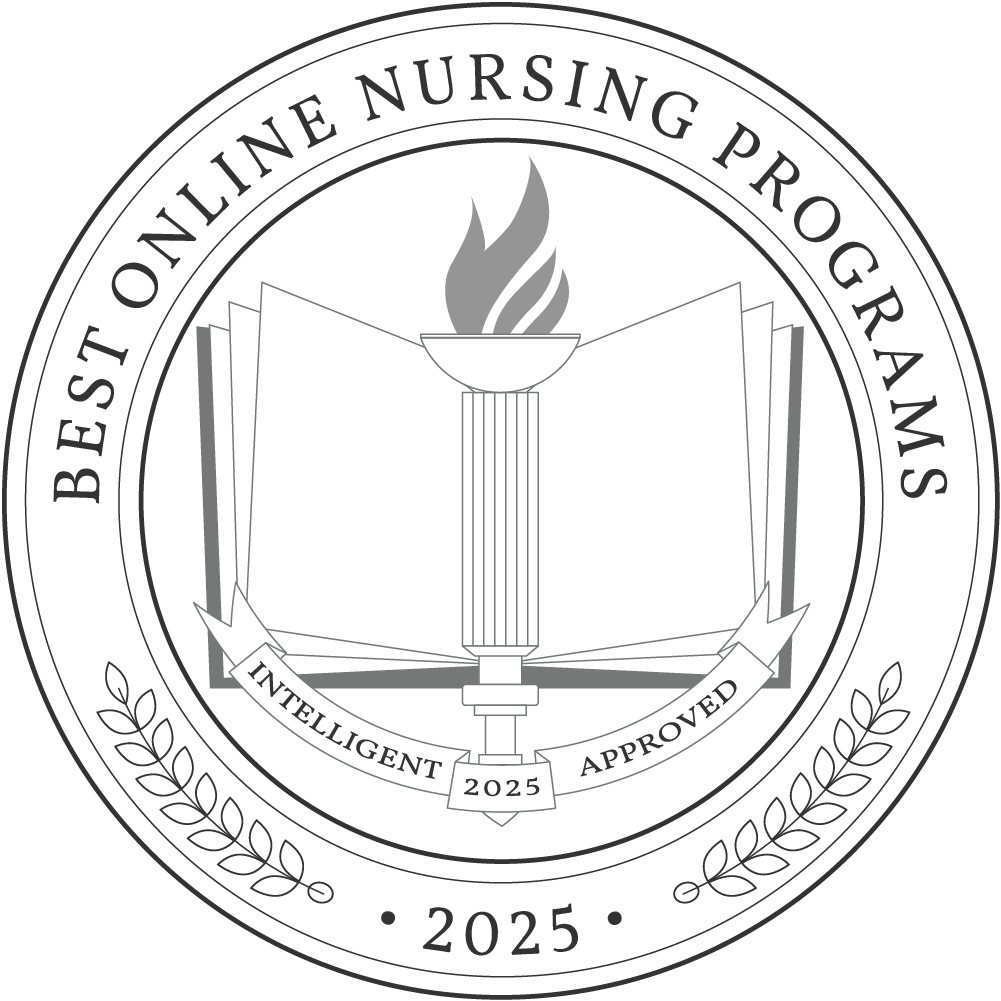With an aging population and post-COVID turnover in the healthcare industry increasing the demand for trained registered nurses (RNs), now is an ideal time for students to earn an online nursing degree. Whether you’re a current RN wanting to advance your skills and increase your earning potential or a healthcare newcomer seeking a rewarding career helping others, an online nursing degree can help you reach your goals.
According to the Bureau of Labor Statistics (BLS), employment of RNs is expected to grow 6% by 2032, which is faster than the average for all occupations. RNs earn a median annual salary of $81,220. Earning a Bachelor of Science in Nursing (BSN) can also be a stepping stone to other lucrative careers, such as nurse practitioner or physician assistant.
Intelligent.com evaluated dozens of programs based on factors like cost, curriculum, and graduation rates to create this list of the best online nursing degree programs. This guide also provides expert insight into how to apply to an online nursing degree program, what students can expect from these programs, and how to choose the online nursing degree that’s right for them.
Why Trust Us
Lorem ipsum dolor sit amet, consectetur adipiscing elit. Integer ante odio, consequat sit amet eros ac, aliquam eleifend nisi. Nullam tempor viverra nisl, quis placerat neque bibendum at. Sed nunc metus, consectetur sed commodo eget, gravida in nisl. Cras id dui arcu. Suspendisse potenti. Suspendisse facilisis auctor nisi, at efficitur lectus varius vel. Curabitur eget massa id urna accumsan consectetur ac quis diam. Proin vehicula congue laoreet. Suspendisse laoreet aliquam leo, ac hendrerit nulla ornare a.
Maecenas laoreet mauris sit amet facilisis tristique. Phasellus magna purus, rhoncus at velit eget, egestas vestibulum libero. Phasellus congue congue mauris sed tempor. Etiam finibus scelerisque velit, in elementum ligula. Etiam quis enim ut neque dignissim tincidunt quis a erat.
- Over 3,868 accredited, nonprofit colleges and universities analyzed nationwide
- 52 reputable tech bootcamp providers evaluated for our rankings
- All content is fact-checked and updated on an annual basis
- Rankings undergo five rounds of fact-checking
- Only 7.12% of all colleges, universities and bootcamp providers we consider are awarded
How we rank schools
Our list features the best online Nursing degree programs at top colleges nationwide. Each school featured is a nonprofit, accredited institution — either public or private — with a high standard of academic quality for post-secondary institutions.
We evaluated each school’s program on tuition costs, admission, retention and graduation rates, faculty, reputation, and the student resources provided for online students. We collected data from trusted sources like the National Center for Education Statistics, individual school and program websites, school admissions counselors, and other data sources. Then, we calculated the Intelligent Score on a scale of 0 to 100 based on the following criterion:
Academic Quality:
- Admission rate versus enrollment rate
- Retention rate of students who return after year one
- Accreditation status (regional and programmatic)
- Nonprofit status, both private and public institutions
Graduation Rate
- Overall graduation rate
- Total number of currently enrolled students, including diversity metrics
- Student-to-faculty ratio
Cost and ROI
- In-state and out-of-state per-credit tuition rates and fees
- Required credits to graduate
- Earning potential after graduation
- Availability of federal student loans, scholarships, and other financial aid options
Student Resources
- Available student services for online-only and hybrid programs
- On-campus amenities like tutoring centers and the number of libraries
Read more about our ranking methodology.
The Top 13 Online Nursing Degree Programs
FiltersInstitution Type
Status
- Intelligent Score
- Alphabetically By University Name
- Acceptance Rate
- Enrollment
- In-state Graduate Tuition
- Out-of-state Graduate Tuition
- In-state Undergraduate Tuition
- Out-of-state Undergraduate Tuition

University of Florida
Intelligent Score: 99.60In-state: $4,477
Out-of-state: $25,694
In-state: $10,770
Out-of-state: $10,770
SAT: 1290-1460
ACT: 29-33
Resident: $112
Non-Resident: $500
Online
Commission on Collegiate Nursing Education
120

University of Wisconsin-Madison
Intelligent Score: 97.28In-state: $9,273
Out-of-state: $37,161
In-state: $10,728
Out-of-state: $10,728
SAT: 1260-1460
ACT: 27-32
$452
Online
Commission on Collegiate Nursing Education
124

Texas Tech University Health Sciences Center
Intelligent Score: 97.03In-state: NA
Out-of-state: NA
In-state: $60,679
Out-of-state: $60,679
SAT: 122 - 131
ACT: N/A
Resident: $222
Non-Resident: $632
Online
Commission on Collegiate Nursing Education
61

UTHealth Houston
Intelligent Score: 96.5In-state: $11,448
Out-of-state: $40,032
In-state: $12,028
Out-of-state: $12,028
SAT: 1210-1470
ACT: 26-33
Resident: $273
Non-Resident: $1,099
Online, On Campus
Commission on Collegiate Nursing Education
60

University of Providence
Intelligent Score: 95.63In-state: $26,462
Out-of-state: $26,462
In-state: $31,500
Out-of-state: $31,500
SAT: 830-1010
ACT: 16-23
$1,052
Hybrid
Commission on Collegiate Nursing Education
54

The University of Texas at Arlington
Intelligent Score: 95.12In-state: $11,448
Out-of-state: $40,032
In-state: $12,028
Out-of-state: $12,028
SAT: 1210-1470
ACT: 26-33
$425
Online
Commission on Collegiate Nursing Education
121

Thomas Edison State University
Intelligent Score: 95.05In-state: $14,742
Out-of-state: $16,926
In-state: $22,623
Out-of-state: $22,623
SAT: Not Required
ACT: Not Required
$311
Online, Hybrid
Commission on Collegiate Nursing Education
60

North Dakota State University
Intelligent Score: 94.74In-state: $8,606
Out-of-state: $12,909
In-state: $7,013
Out-of-state: $7,013
SAT: 1028-1243
ACT: 20-26
Resident: $456
Non-Resident: $685
Online, Hybrid
Commission on Collegiate Nursing Education
53

Clemson University
Intelligent Score: 93.29In-state: $14,118
Out-of-state: $37,110
In-state: $10,600
Out-of-state: $10,600
SAT: 1210-1390
ACT: 27-32
$550
Online, On-Campus
Commission on Collegiate Nursing Education
123-124

Medical University of South Carolina
Intelligent Score: 92.98In-state: $57,828
Out-of-state: $59,700
In-state: $48,121
Out-of-state: $48,121
SAT: 1110-1320
ACT: 22-30
In-State: $686
Out-of-State: $1,440
Online
Commission on Collegiate Nursing Education
121

Emory University
Intelligent Score: 92.88In-state: $53,070
Out-of-state: $53,070
In-state: $43,800
Out-of-state: $43,800
SAT: 1380-1530
ACT: 31-34
$1,706
Online
Commission on Collegiate Nursing Education
48

Western Governors University
Intelligent Score: 88.28In-state: $6,380
Out-of-state: $6,380
In-state: $7,500
Out-of-state: $7,500
SAT: N/A
ACT: N/A
$287
Online
Commission on Collegiate Nursing Education
120

University of Central Florida
Intelligent Score: 88.26In-state: $4,478
Out-of-state: $19,810
In-state: $6,916
Out-of-state: $6,916
SAT: 1160-1340
ACT: 25-30
In-State: $179
Out-of-State: $716
Online
Commission on Collegiate Nursing Education
120
What Can I Expect from an Online Nursing Degree Program?
A student’s experience in an online nursing degree program will vary based on what type of degree they pursue.
| Type of program | Program designed for | Description | Number of credits |
| Traditional BSN | Undergraduate students who don’t have an educational or professional background in nursing | — Foundational and intermediate-level principles and skills in nursing and related areas
— Clinical practice hours required — Specialization options may be available — Includes general education requirements |
120 |
| RN-to-BSN / ADN-to-BSN | RNs with a diploma or associate degree who are seeking a bachelor’s degree | — Intermediate and advanced nursing principles and clinical skills
— Clinical practice hours required — Specialization options may be available — Minimal general education requirements |
30-60 |
| Accelerated BSN | Students who hold a bachelor’s in a different area of study | — Foundational and intermediate-level nursing skills and concepts
— Clinical practice hours required — Specialization options may be available — Minimal general education requirements |
30-60 |
| RN-to-MSN | RNs who want to earn BSN and MSN degrees | — Intermediate and advanced nursing skills and concepts
— Clinical practice hours required — Specialization options may be available — Minimal general education requirements |
60 |
For students enrolling in a traditional or accelerated BSN program in pursuit of the RN license, it’s important to confirm that the program they select meets the requirements for the National Council Licensure Exam (NCLEX), as well as their state’s requirements for licensure.
Coursework in an online nursing degree program typically consists of foundations of professional nursing, clinical nursing skills, microbiology, anatomy and physiology, health assessment, research, healthcare policy and advocacy, emergency care, clinical nursing leadership, and more.
Hands-on clinical experiences are also a crucial part of nursing education. Even in online programs, students participate in in-person simulation labs, practicums, and clinical rotations to help them develop their assessment and treatment skills. Requirements for the number of clinical hours students must complete vary based on their current education and experience level and the state’s licensing regulations, but they typically range from 300-800 hours total. Students can complete their clinical hours in hospitals, urgent care clinics, community health centers, outpatient medical facilities, and more.
Online nursing degree programs may also include opportunities for specialization, either with a specific patient population (neonatal, pediatric, adult, or gerontological care) or within a particular area of medicine (oncology, cardiology, intensive care, psychiatric care).
How a program is delivered will also impact what students can expect. Many programs are offered asynchronously, where students don’t have scheduled class meetings. Instead, students access and complete lessons and assignments on their own time. Students who want a more traditional experience may seek out a synchronous program where classes are conducted live at pre-scheduled times, with students attending virtually from wherever they’re located. Depending on the program, students may be able to enroll full-time or part-time.
How we rank schools
This list features some of the best online nursing degree programs in the U.S. The schools on this list are non-profit, accredited institutions, either public or private, with high-quality standards for post-secondary education.
We evaluated each degree program on tuition costs, faculty, reputation, student resources, and admission, retention, and graduation rates. We also compared our picks to a list of aggregated college rankings from reputable publications like the U.S. News & World Report, among others. Using this data, we calculated an Intelligent Score for each program on a scale of 0 to 100. Read more about our ranking methodology.
Still Looking for the Right Fit? Discover Similar Programs
There are various degree programs available in nursing and related areas. To find the one that best meets your needs and goals, consider these additional options:
- Online Bachelor’s in Nurse Practitioner Degrees
- Online RN-to-BSN Degrees
- Online Accelerated RN-to-BSN Degrees
- Online Master’s in Nursing Degrees
- Online Nurse Practitioner Master’s Degrees
What Can I Do With an Online Nursing Degree?
Career outlook
An online nursing degree can prepare students for entry- or intermediate-level roles as RNs. These individuals provide and coordinate patient care in settings like hospitals, outpatient treatment centers, community health clinics, private practices, urgent care centers, and more. RNs often work in teams with doctors and other healthcare specialists to develop and administer treatment to patients.
The job outlook for RNs is strong, with the BLS predicting, on average, 193,100 new job openings annually through 2032. A rapidly aging U.S. population is one of the key driving factors in the need for RNs, as is high turnover in the healthcare industry following the COVID-19 pandemic.
A BSN can be a terminal degree for students who want a career as an RN. It can also lead to further education in advanced practice areas, such as nurse practitioner, nursing administration, physician assistant, or health services.
There are many specialization options available within the nursing field. Some of the most popular include:
- Nurse informatics
- Nurse educator
- Psychiatric/mental health nurse
- Midwife/doula
- Nurse manager/administrator
- ER nurse
- Neonatal nurse
How to Choose the Online Nursing Degree Program That’s Right for You
Step 1: Choose your area of study
To make your search for an online nursing degree program as smooth and efficient as possible, it’s helpful to clarify early on what your educational and career goals are.
First, determine how your current professional and educational background will influence the type of nursing degree program you need. Review licensure requirements for the state where you will practice to ensure you’re considering programs that meet eligibility criteria.
Reflect on whether a specific type of environment or patient population interests you. This can help guide you to programs that offer electives, specializations, and clinical experiences in your area of interest.
Another parameter to set at this stage is what type of program you want, including synchronous or asynchronous content delivery and full- or part-time enrollment.
Step 2: Research schools and programs
Now, you can begin exploring specific schools and programs to determine which one might be the right fit for you.
A key piece of information to confirm when researching schools is whether they have institutional and programmatic accreditation. Institutional accreditation impacts students’ eligibility for financial aid, nursing licensure, and future education opportunities. Students can confirm a school’s accreditation using the Council on Higher Education Accreditation (CHEA) database. It’s also important for nursing students to confirm that the program is accredited by the Accreditation Commission for Education in Nursing (ACEN) to ensure it meets industry standards for nurse practitioner education.
There are several avenues through which students can research schools, including visiting websites for schools and programs, attending virtual open houses or information sessions, speaking to admissions counselors or program representatives, and following programs on social media.
Other essential information students should collect includes:
- What the curriculum consists of, including core courses, electives, and specialization options
- How courses are delivered (synchronously or asynchronously)
- Clinical rotation requirements
- Faculty credentials
- Available support services for online students, including tutoring, counseling, tech support, library resources, and networking opportunities
- Program cost, including fees
Step 3: Prepare for applications and tests
Each school establishes its own processes and deadlines for applications. Students should visit the school’s admissions website or speak to an admissions counselor for the most accurate information about what they should prepare for their application. Using a spreadsheet or checklist can be helpful to students applying to multiple programs.
A standard application for an undergraduate degree consists of:
- Completed application and required fees
- High school or college transcripts
- Letters of recommendation
- Personal statement or essay
- Resume or CV
- SAT or ACT scores
Eligibility requirements vary based on the program level. Applicants to RN-to-BSN or RN-to-MSN programs must have an active nursing license and an associate degree or diploma in nursing. They may also have to demonstrate a minimum GPA in their prior program. Students entering a BSN program with no prior nursing experience typically must have a minimum GPA. They may also have to complete prerequisite coursework before enrolling.
Step 4: Select your program
The number of online nursing programs a student applies to varies based on individual needs and preferences. Some students focus on a single program due to format, faculty, specialization options, or cost. Others may apply to several schools to increase the odds of admission. Remember that schools often charge application fees and budget accordingly if you apply to several programs.
After receiving your acceptance offers, compare your options based on your priorities and choose the one that meets all or most of your needs.
Step 5: Determine how you’ll pay for your degree
While researching schools, get as much information as possible about the program’s full cost (including fees) and the financial aid options available to you.
There are two forms of financial aid — need-based and merit-based. For need-based aid, students must complete the Free Application for Federal Student Aid (FAFSA). Need-based aid includes federal student loans, grants, scholarships, work-study, and assistantships.
Schools and external organizations will also consider students for merit-based aid like scholarships, grants, and fellowships based on their achievements and aptitudes.
If students plan to work while earning an online nursing degree, they should inquire about employer tuition assistance benefits to help subsidize their education. Active-duty military members and veterans may be able to get discounted tuition or use GI Bill benefits to pay for their degrees.
Online College/Degree Scholarship Database
Intelligent Scholarship Finder Tool
"A Helping Hand" Scholarship
Award Amount: $500
Due Date: January 31, 2025
"Follow Your Own Path" Essay Scholarship
Award Amount: $500
Due Date: January 31, 2025
"Tuition Solution" Scholarship for STEM Students
Award Amount: $500
Due Date: January 31, 2025
$25k "Be Bold" No-Essay Scholarship
Award Amount: $25,000
Due Date: Closed for 2024
(ISC) Graduate Cybersecurity Scholarship
Award Amount: $5,000
Due Date: Closed for 2024
(ISC) Women in Information Security Scholarship
Award Amount: $5,000
Due Date: Closed for 2024
A.C. "Kate" & Leo Joseph Merlone St. Dominic Catholic Church of Saginaw Member Scholarship
Award Amount: Varies
Due Date: Closed for 2024
A.C. "Kate" & Leo Joseph Merlone Teaching Scholarship
Award Amount: Varies
Due Date: Closed for 2024
a/e ProNet David W. Lakamp Scholarship
Award Amount: $5,000
Due Date: Closed for 2024
AAAE Native American Scholarship
Award Amount: $1,500
Due Date: March 15, 2025
Frequently Asked Questions About Online Nursing Degree Programs
Should I get a nursing degree in person or online?
Whether you earn a nursing degree online or in person often depends on personal needs and preferences. There are advantages and disadvantages to both learning formats.
Students who learn best by engaging with classmates and faculty and participating in hands-on learning experiences may want to pursue an in-person program, which will provide more opportunities than an online one. In-person learning may also work better for students who need more structure and support to keep them accountable.
Meanwhile, online classes are ideal for students who need flexibility and convenience to complete their degree program. Online nursing degree programs typically use the same curriculum as in-person programs, so students are able to gain all the skills and knowledge they need, but on their own schedule. Students enrolling in an online nursing program should ensure they have the organizational, time management, and self-motivation to keep themselves on track, as these programs require more independent learning.
How do I apply to an online nursing degree program?
Talk to an admissions counselor or visit the school’s admissions page to confirm the application processes, deadlines, and requirements. Find out if the school uses the NursingCAS common application, which can streamline the process of applying to nursing programs.
Most schools accept applications and supporting documents electronically through their website’s application portal. However, some programs may require certain official documents, like transcripts and test scores, to be submitted directly from the school or testing agency.
It’s also important to verify that you meet the minimum eligibility requirements for a program before applying. For example, students applying to an RN-to-BSN or RN-to-MSN program must show they have an active nursing license. Students applying to a traditional BSN program may require a minimum high school GPA or prerequisite coursework.
What is the average cost of an online nursing degree?
The National Center for Education Statistics (NCES) reports that for the 2021-22 academic year, the average annual tuition for undergraduate programs was $9,596 at public institutions and $37,222 at private colleges.
Many factors influence how much students will pay for an online nursing degree. For example, students attending a public institution should note whether the school has different tuition rates for in-state and out-of-state students or if distance learners all pay the same tuition rate. Many schools charge additional fees for virtual classroom technology, labs, background checks, or other resources, which students must factor into their budgets.
Nursing students should also consider the financial impact of clinical rotations. This may mean taking time off from your current job or budgeting for transportation expenses to your clinical site, like gas, parking, or public transportation.
Students should always speak to a financial aid counselor for the most accurate information about program costs and payment options.
How long does it take to complete an online nursing degree program?
The length of time it takes to complete an online nursing degree depends on how many credits a student must earn for the degree they’re seeking and the pace at which they complete the credits.
Full-time students can typically complete a 120-credit BSN program in four years of full-time study or five years of part-time study. Meanwhile, RN-to-BSN programs take less time to complete since they require fewer credits than a traditional BSN. Full-time students can expect to finish an RN-to-BSN in 1-2 years of full-time study or 2-3 years of part-time study.
Is an online nursing degree worth it?
All degrees have value if students are willing to put the time and effort into learning and mastering the skills the program covers. Before enrolling in an online nursing degree program, students should be sure they have the energy and time to prioritize their studies to get the most out of their program.
From a career perspective, the demand for nurses is expected to continue steadily through the next decade. This is driven by an increase in the elderly population, as well as a need to replace RNs who retire, switch careers, or move to advanced positions. There will be an average of 193,100 new openings for RNs every year through 2032, the BLS reports.
The pay for RNS can vary widely based on setting and location. The median annual salary for RNS in 2022 was $81,220, with the lowest 10% of earners making less than $61,250 per year. In recent years, nurses and healthcare workers throughout the U.S. have taken action, including striking, to demand better pay and working conditions amid changes in the healthcare industry.
Read More about Online Nursing Degrees
- Best Online HBCU Nursing Programs
- Best Accelerated Online Nursing Degree Programs
- Best Online Nursing Degree Programs for Non-Nurses
- Best One-Year Online Nursing Degree Programs
- Can You Get a Nursing Degree Online?
- Easiest Nursing Schools to Get Into
- How Hard Is Nursing School?
- Understanding the Types of Nursing Degrees


